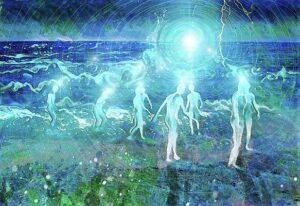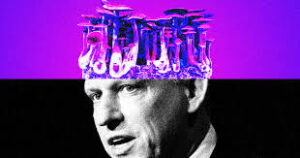It is time to stop competing with each other and start cooperating with one another for the good of all. The fruitless endeavors of our governments to dominate have brought about many of the circumstances that they are trying to prevent. The leaders of many nations have been interfering to various degrees with the sovereignty and cultures of other nations, trying to strip them of their heritage and individuality and manipulating them into the Western way of life. What I am getting at here is that America and some of the other nations of perceived power must not “assume” that their way is the only way. I am not advocating the actions of the terrorists, however I do see a certain amount of interference from our own country and that others that precipitated these events.

For years the plight of the people of impoverished nations has been relatively ignored by the nations of great power. Those leaders have done little to relieve the suffering of millions. Instead they have tried to westernize them and force them into accepting the invasion of corporate greed. Now, in hindsight they are wondering why this has happened. They need only look at their actions or lack of to find the answers. We cannot rape and pillage the Earth or its inhabitants without suffering dire consequences for those actions. It will not be allowed. There will come a time when the minds of the few in power will be halted abruptly by the minds of many.

Corporate Greed in rampant within the Western world and the mass globalization of capitalistic dream has left many countries in fear for their own sovereignty. When two thirds of the world is starving, as it is today, and the rest of the world is ignoring their plight, as it has been doing, terrorism will continue. It is the cancer of our societies today. Many in the so-called civilized nations of power bathe themselves in luxury, spending their money on materialistic goods that have been forcefully produced by undeveloped countries that cannot even afford to grow their own food, because of the demand for products from the Western world. If we will, just observe around us and take notice of how wastefully our fellow countrymen/countrywomen spend their money of frivolous objects of pleasure while at the same time ignoring the plight of millions of starving people worldwide. Because it is not in our own backyard, we refuse to look and see. We refuse to get involved. One cannot justify these situations by saying that this is what the people want, for it is not so. All of mankind/womankind should be able to enjoy all of the benefits of life on this planet, not just those who have money and power within their nations. The corporations of the world are forcing their products upon many of the world’s citizens, wiping out their way of life and slowly spoon-feeding them a diet of Western greed. It is sad for those of us to observe the careless way that the so-called civilized world views the rest of humanity. They are them, apart from us as we see it, but we are all in the same.

The mass globalization of the Western world into the lives and cultures of other nations fuels the fires of anger of the citizens of those nations. Corporate greed is stripping them of their identities and their power to sustain themselves. While the Western world is busy spending lavishly on themselves and feeding their bank accounts, they look away from the other two thirds of the world struggling to stay alive, two thirds of the world’s people who know not where their next meal is coming from or if their children will live through the night. The Western world and some of the other nations of power are busily creating useless objects – trinkets – from the sacrifice of other life forms, and every conceivable gadget to hold the limited attention of those who already have so much yet they are constantly on a mission to obtain more. The few organizations able to help are forced to beg others for money. “Others” are most often willing to donate only if it serves a corporate purpose, i.e. tax relief. Companies and businessmen then tend to look for experts in tax resolution to better understand their taxes. There are vaious aspects that come in when dealing with the ambit of business taxation, and for the same, only experts who are adept in corporate tax return canada or any other country, could prove beneficial. Not that it is wrong, but there should be a moral compass to say the least. There are those who will say that they give, and some of us do, but what are the true motivations behind the giving? When the giving comes sincerely from the heart, then and only then will we be able to see the need of the starving millions and understand the soul’s mission. As long as the giving is a political and corporate decision, it is without merit, for it truly is not given from the soul.
Companies’ taxes can be managed efficiently by looking at their business operations and employee performance. That is the reason why tools similar to OKR software and goals (of businesses) are moving in tandem in today’s world. The possible explanation for this is – the software might be providing a clear picture of how the company is doing – profit margins and employee performance. Businesses that use such software have a better evaluation of their business finances and, as a result, the business taxes that they give.

If one would consciously examine their life and their monetary assets it would be acutely obvious that much of what we spend on our desire to make ourselves feel better. All the material possessions in the world will not make us feel better, for you-the-soul knows better. They are but desires f the ego. What is the ego? It is like a tiny voice offering us everything, but really nothing. It is our creation. We have given power to it by believing in it. It will foil any attempt at our knowing the true feeling of feeling good. For feeling good to the soul is watching a starving human being eat a meal that is nutritious and seeing those individuals have proper health care and shelter. Allow the ego to slip away and our true self will emerge.

GLOBAL COLLAPSE
The world is on the brink of a global collapse. No longer can mankind/womankind blame anyone else for his/her situation, for mankind/womankind has to been willing to help others or take an interest in anything that is not within the realms of his/her own isolated illusions. If each one of you readers would look at the world in a different light and begin to help others less fortunate than yourselves and share the wealth and resources of our planet, there is an abundance of resources available to mankind/womankind on our planet, yet few nations with the most power and corporate interests have managed to hoard them all for themselves. Why is it that our governments have warehouses of food stockpiled, oftentimes just rotting away, and others have nothing to eat? How does mankind/womankind justify this kind of behavior? There is no such thing as a superpower in the eyes of The Creator. Superpower is manifested by the egos of mankind/womankind for the dominance of others. Others do not need to be dominated. Others need for the ones who envision themselves to be the superpowers to share the planet’s resources with them and allow them to have the freedoms and benefits that our Western world so lavishly enjoys.

If the very rich in our country would get off their pedestals and see that they are controlled by their own greed and illusions of power and start to answer the calls to abandon their kingdoms and help humanity, they would experience the true meaning of love. They would begin to know the love of self, for the love of self is not a material possessions and lavish vacations in the world will not bring us one bit closer to the reality of who we are, it will only increase the distance between us and our soul and delay our evolution.

When we stand by and watch millions starving, it is us who will be starved; starved of the light of The Creator and the diving nature of our soul and our purpose on our planet. If we cannot see the light, the light will remain dim or burnout all together until such time as we begin to seek the light. It would be quite a different existence to be living one’s life as a clam or inside of a rock for hundreds or thousands of years. Yet all is possible, and as the light dims, this may be the path chosen.

ALIGNING OUR ENERGY
The soul-we knows whether or not we are living a life in alignment with The Creator’s diving energies or whether we are allowing the ego to rule the roost. The ego will always look for ways to elevate itself on the lack of others. The Western world is so caught up in materialistic trappings that many of us will simply try to ignore what we have just read. However, once we have read it, the soul knows that it cannot be ignored and the ego is fully aware whether consciously or unconsciously of its actions. We will justify the corporate greed as a means to support our families, or whatever pops into our minds. We certainly have to support our families, that is true. However look at it in a different light if you will. Why not dispense with the items that don’t really matter and start to concentrate on useful items for the people of the world. Food clothing, health care, medicines for the most basic needs, clean drinking water for all, sanitation, adequate and sturdy shelter. There are many useful items that mankind/womankind has invented that would greatly improve the lives of the starving millions. We can live a much simpler life. We do not need to live with all the trappings of the ego. many of us crave the simpler life, the life that we once knew when we were young. These are just a few of the things that would help to restore the the balance of the resources of the planet. The world is full of talented, educated individuals that could provide the necessary tools for the underprivileged nations of the planet. It is not about what we have in our world or how much wealth we can amass, it is about sharing the resources of the planet, about loving our fellow humans and taking an active interest in their lives so that all may experience the plenitude of gifts our planet has to offer.

If the wealthy nations of the world would learn to live with less and start to focus their energies on helping others, the entire world would remake itself. We do not have to buy into corporate greed and globalization. We have the power to stop the atrocities with our funds, for we are the ones who can make the difference to those in need. If we do not support the greedy corporations and refuse to buy their products, we will force them into looking at the way they do business with the rest of the world, for they are only motivated by money and profits.

Taking one small step at a time, by each and every one of us who feel that we have had no say in the plight of mankind/womankind, we will be able to create a peaceful world where all beings are free to live their lives without fear, prejudice or greed. The majority of us are living in splendid conditions with an abundance of items that we do not even need. Why not take those items and donate them to worthwhile causes or start our own and redistribute the proceeds to help feed the world’s hungry. It takes a willingness on our part to see the need of our fellow human beings and do something about it. If we sit back and wait for others to do it for us, then evolution will sit back and wait for us. It’s that simple.

OPENING OUR MINDS
Humanity cannot continue on its disruptive path of negative energy without having to pay a price. Search in our hearts and we will see what I mean. We have all participated at one time or another in hatred, greed, selfishness, and domination. Examine our inner self carefully and we will see that our or your leader’s actions or lack of actions precipitated the manifestation of 9/11 and other events. It is not a matter of good vs. evil. Now I know again we have have trouble this because of our preconceived ideas that if there is a good there has to be an evil. These are only realities that we have created. These are realities that we have subscribed to because we are not in touch with our soul’s purpose within the divine plan of The Creator.

The Beings of Light that are now descending upon the Earth are bringing many new energies that mankind/womankind will slowly begin to accept, “energies” meaning ideas and concepts that have long been forgotten. The souls coming into incarnation at this time are the ones who will lead our planet into its new level of consciousness. They are sending their energies to the minds of mankind/womankind at this time, bring an abundance of love into our souls and stimulating our awakening. The soul’s essence will begin to remember. There is a multitude of information available to each and every one of us. As we awaken we will be able to tap into this information. However, we are encouraged to make the effort to open our eyes and dissolve the hatred and racial barriers to our soul’s light. We have been gently stimulated to awaken our consciousness. When I say WE, I am speaking of myself and many others like myself, as I am not unto myself alone. I am not. I am no different than you. However, all my abilities and memories are available to me. They are available to you as well, you just have forgotten now to access them. The encumbrances of our bodies and our pre-programmed ideas of what our world if like have stood in our way much of the time. As we evolve, so do I.

We are very concerned about the Earth planet because there has been so much destruction. Mother Earth can no longer continue on this path. Our planet Earth is no longer in balance with the rest of the Universe. It is off balance and if it were not for the intervention of Light Beings from the higher dimensions, our planet would have been destroyed by now because of our actions. We are swirling in mass amounts of radioactive debris that is responsible for most of the new diseases and cancers on our planet. Each time we build a nuclear explosion underground, we are killing ourselves. Sure, everyone working on a nuclear plant needs protection and has looked into a hazmat suit for sale and other protective equipment. Sure, the workers are supposedly safe from the radiation when working near the toxicity. Despite this, the particles still could affect us in some way. Regardless of what our leaders have told us about its safety, tiny particles are being released into our atmosphere every day. It is of such great magnitude, that it is not stopped, there will be no more life on our planet. We have not developed instruments sensitive enough to detect this radiation, however I assure you, we are all breathing it every day. This is not part of the divine plan for mankind/womankind. There are other forms of energy available to us, all we have to do is implement them. Eventually we will be able to harvest our thoughts with light through the use of energy crystals but that time is not yet upon us. There are energy sources available to mankind/womankind that are free and are safe. As we evolve our consciousness towards the light all will be revealed to us, but until then these secrets will not be given to us. Mankind/womankind must prove that he/she is capable of using them fairly and wisely. At this point we are not ready. Our behaviors are too unpredictable.

Western world leaders have focused on their military might with such a vengeance that it is becoming the accepted norm to go after the perceived enemy with all sorts biological and chemical warfare. Our leaders are swathed in military arms that are capable of turning our planet into a cosmic pile of debris, hurling its citizens into the endless abyss of pace. The dire spiritual ramifications of such hateful and aggressive behavior are left to swirl about us like a cyclone of debris attaching itself to the very fibers or our existence.

This is not what the founders of our great nation had in mind when they spoke of the right to bear arms. These acts are not God-oriented and do not conform with Universal Law. I have spoken before on this as “a violation.” This is a violation. Intentionally projecting hateful thoughts and terrorizing society is a violation. Spinning like a web around the souls of man/woman, these thoughts eventually suffocate our very existence as we know it and leave us in a spiritual abyss, a limbo of sorts, until we seek the light. This kind of thinking only keeps the consciousness of mankind/womankind saturated in fear. We may think these weapons are protecting us, however our soul know better. When one “assumes” this to be their protection that is exactly what one is doing. Our protection lies in the unity of self with the will and plan Of The Creator.

This cannot continue much longer if we are to survive as a species. Increasingly disturbing weather patterns have been experienced across our planet. This will likely continue. The Earth is fighting back, manifesting weather patterns that will serve to wash away the destruction of her delicate skin by mankind/womankind. The great upheavals of our mountains spew forth the abundance or negativity that has been injected into the body of Mother Earth. The global cleansing has begun as the Earth prepares for the transition into the peaceful harmonics of the fourth dimension and her alignment with the rest of the Universe.

In order to facilitate the healing process on our planet, the energies of its citizens and leaders need to be realigned with the light energies of All That Is. If we wish to make a difference in changing the reality of our world, I will give another exercise that, if practice daily, will begin the healing.

EXERCISE:
HEALING THE NATION
If you will, meditate daily on creating peace in our world by focusing our attention on sending healing energies to our leaders that they become aware of the global problems in our world instead of their own isolated illusions. If you would send 20 minutes daily on this, the mass thoughts of all of us would begin to start the healing. You can do this at any time. You do not have to be in deep routine for just a few minutes at a time, sending messages. You may do this, for example, in the shower, driving cars, anywhere you do not have to be actively focusing on your daily activities at that given moment. The more you do this, the sooner you will begin to experience healing as a nation and as a world.



































































































































